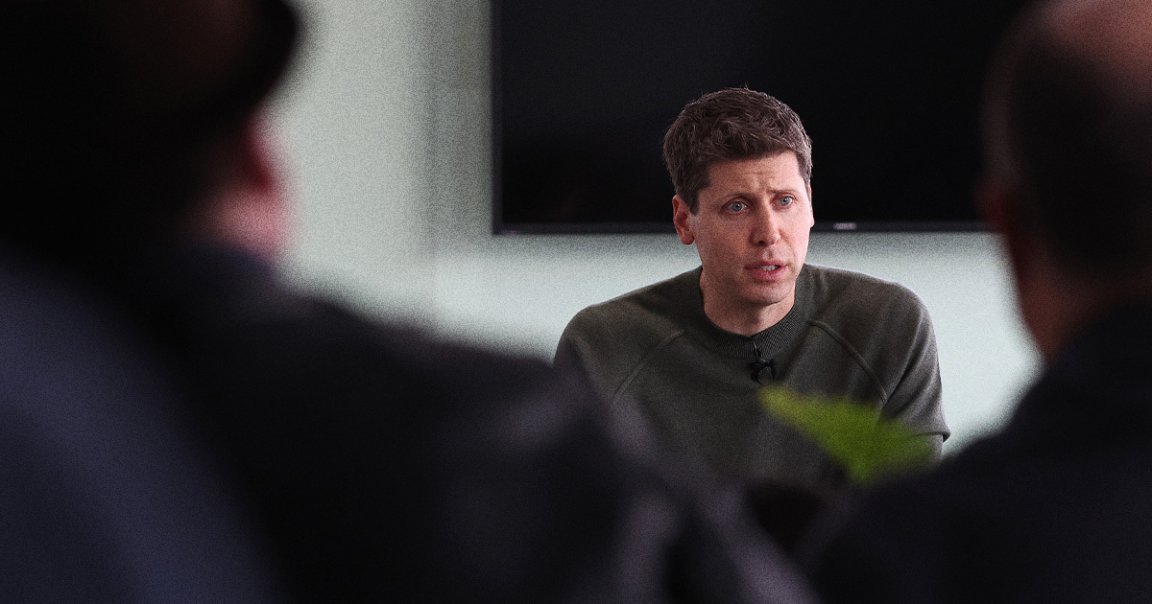
A warning to anyone with a penchant for side hustles: if you happen to be the CEO of the world’s preeminent AI creator, your board might not be thrilled with your extracurricular activities.
It’s still unclear why Sam Altman, OpenAI’s recently-fired CEO, was pushed out of the fast-rising Silicon Valley AI company that he’s become more or less synonymous with. Altman was not only one of the AI maker’s original founders, but its public face, making press-heavy splashes at the White House, weirdly religious-sounding AI predictions, and overall leaning into his casting as the Oppenheimer of the burgeoning AI era. As such, his ouster was a surprise to pretty much everyone outside of OpenAI’s now-teetering board, including the vast majority of OpenAI employees, the CEO of the heavily OpenAI-invested Microsoft, and Altman himself.
Upon Altman’s firing, announced Friday, OpenAI released a fuzzy statement — since updated — noting that a “deliberative review process” by the board had concluded that the charismatic leader was “not consistently candid in his communications with the board, hindering its ability to exercise its responsibilities.” It’s incredibly vague, and one that’s lent itself to intense speculation. Did the talk of not being “candid” mean Altman had lied to the company’s governing body?
And now, one feasible explanation may have floated to the surface. As Bloomberg reports, prior to his shocking expulsion Altman had been spending time in the Middle East raising funds for a new chip venture billed as a competitor to Nvidia — a high-dollar side project that sources say added extra pressure to an already-strained relationship.
Per Bloomberg, Altman’s side hustle, dubbed “Tigris,” appears quite ambitious. Nvidia has a chokehold on the semiconductor marketplace, as its popular GPU chips remain the favorite among AI startups for their computing power; Altman, according to Bloomberg, wants to take some of that market share away from Nvidia by introducing his own lower-cost Tensor Processing Units, or TPUs, to the industry. This would not only stand to displace the market incumbent but would also give OpenAI more control over its production, likely making its products cheaper in the long run.
While the imagined chip would theoretically lower production costs over time, though, the effort certainly wouldn’t be cheap on the front end. According to Bloomberg, Altman is seeking tens of billions of dollars for the nascent venture from the likes of SoftBank, Saudi Arabia’s Public Investment Fund, and Mubadala Investment Company. So, no small effort!
And it’s not just Tigris that the former OpenAI CEO — who’s already found employment at Microsoft — is said to be hunting down investors for. According to Bloomberg, Altman is also collaborating with legendary Apple designer Jony Ive on a secret-shrouded AI hardware effort, which he was actively pitching to potential funders in the Middle East in the run-up to his surprise firing.
You’ll notice a risky throughline between those side projects as well: they’d both be swimming in the same financial waters as OpenAI, with the chipmaker potentially selling its hardware and the Jony Ive one likely using its API.
It may have been especially trepidatious timing for OpenAI’s charismatic leader to be shopping his side hustles around, too. Per Bloomberg, OpenAI has been looking to clinch a delicate offer that “would let employees sell their shares at an $86 billion valuation.” It could well have been that OpenAI’s board feared that Altman’s personal fundraising could disrupt the deal, or worse, garnered government scrutiny, especially considering the federal government’s particular sensitivities around technologies like AI and chips.
Again, though, this fundraising may only have been the final back-breaking straw. OpenAI has a fairly bizarre structure — it’s a for-profit company controlled by a non-profit board, and over the past year, it’s seemed that the company’s non-profit “open” roots have been more challenged than ever. As AI safety concerns loom larger, it seems that friction around these debates may have arisen within OpenAI.
According to a different Bloomberg report, such friction was notably palpable between Altman and OpenAI Chief Scientist and Geoffrey Hinton disciple Ilya Sutskever. Sutskever reportedly felt that OpenAI, under Altman’s leadership, was paying too little mind to safety standards and guardrails and recklessly charging ahead. These tensions reportedly reached an inflection point at OpenAI’s recent DevDay; some of Altman’s projections and promises concerned Sutskever, who then took his grievances to the board.
It’s not a new pattern for OpenAI, which has seen major breakups in the past as a result of differing AI safety views. But interestingly enough, Sutskever himself has now backtracked, declaring in a tweet today that he “deeply [regrets]” his “participation in the board’s actions.”
“I never intended to harm OpenAI,” he continued. “I love everything we’ve built together and I will do everything I can to reunite the company.”
Altman, for his part, responded with three red heart emojis.
More on OpenAI: Microsoft Immediately Hires Sam Altman after He’s Fired by OpenAI